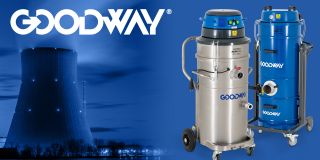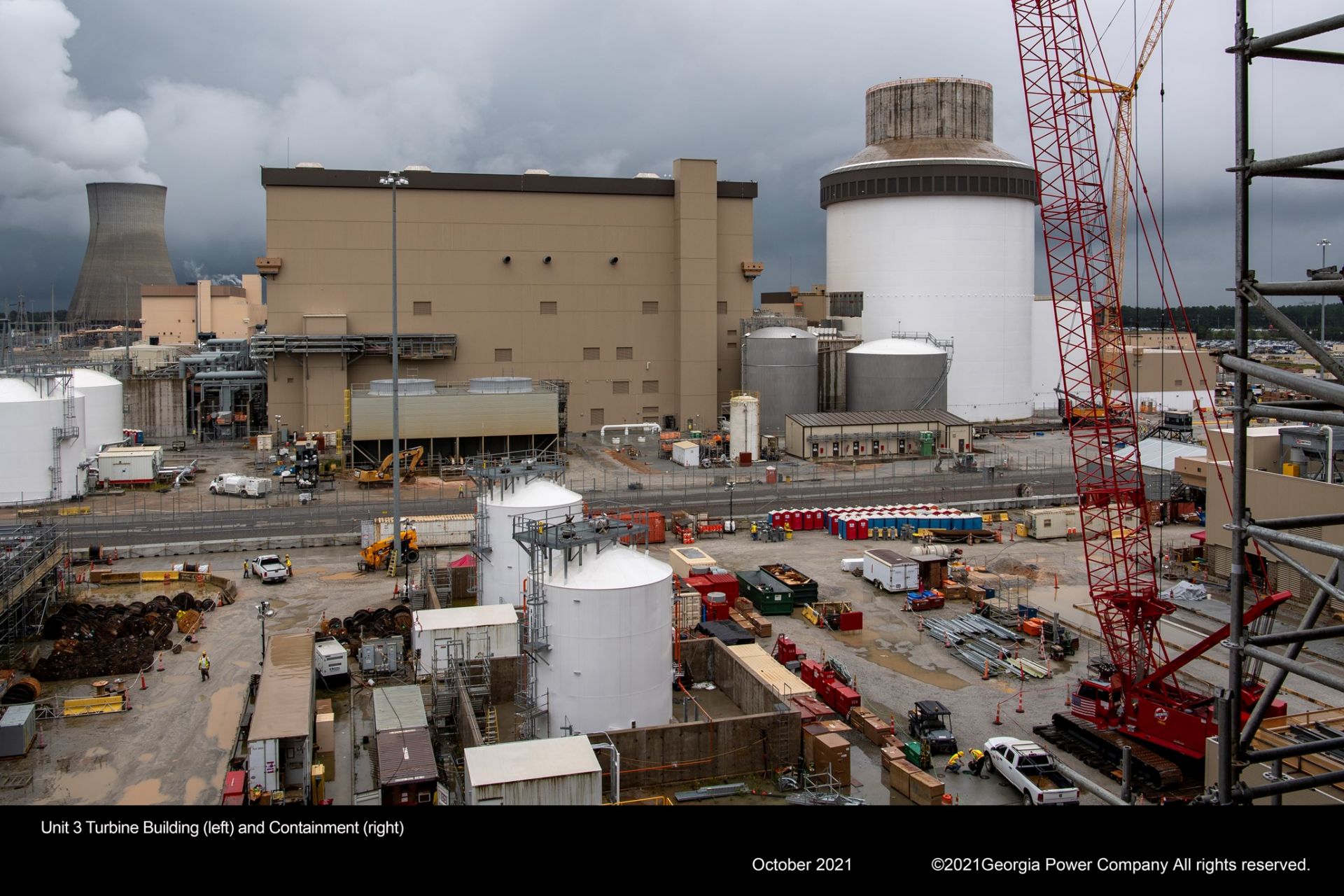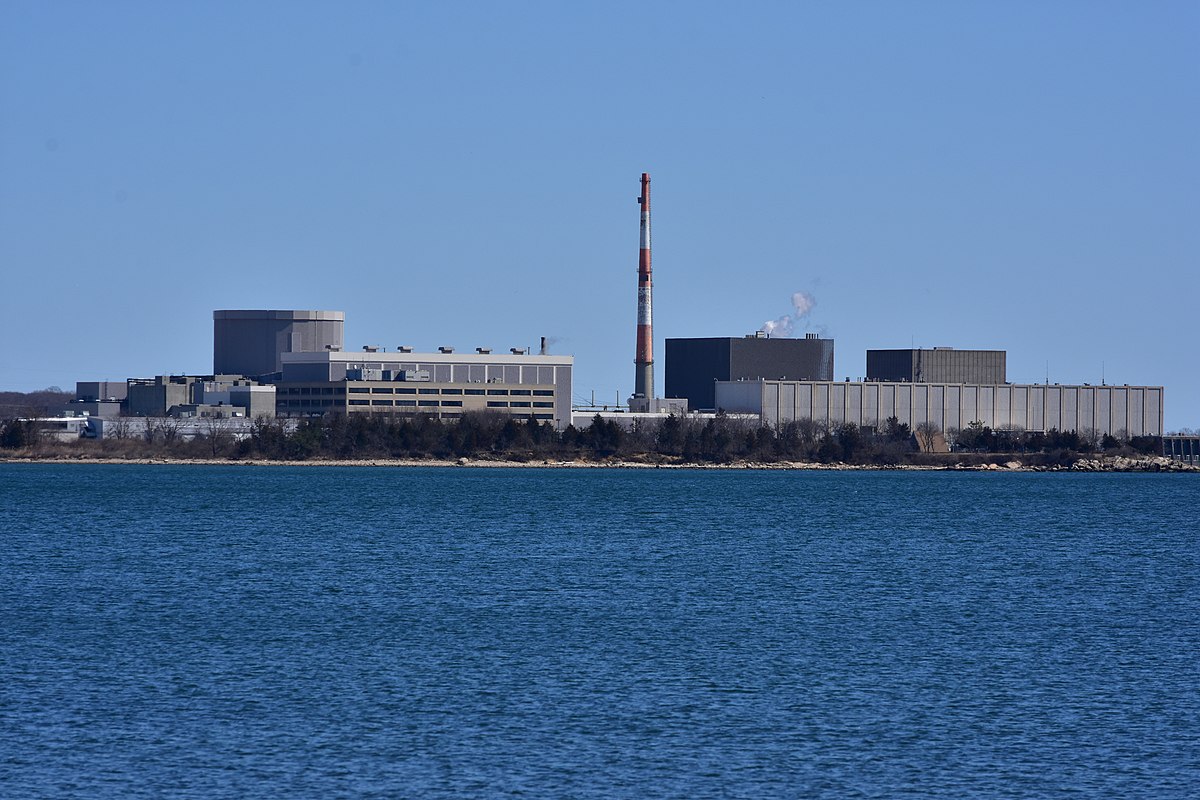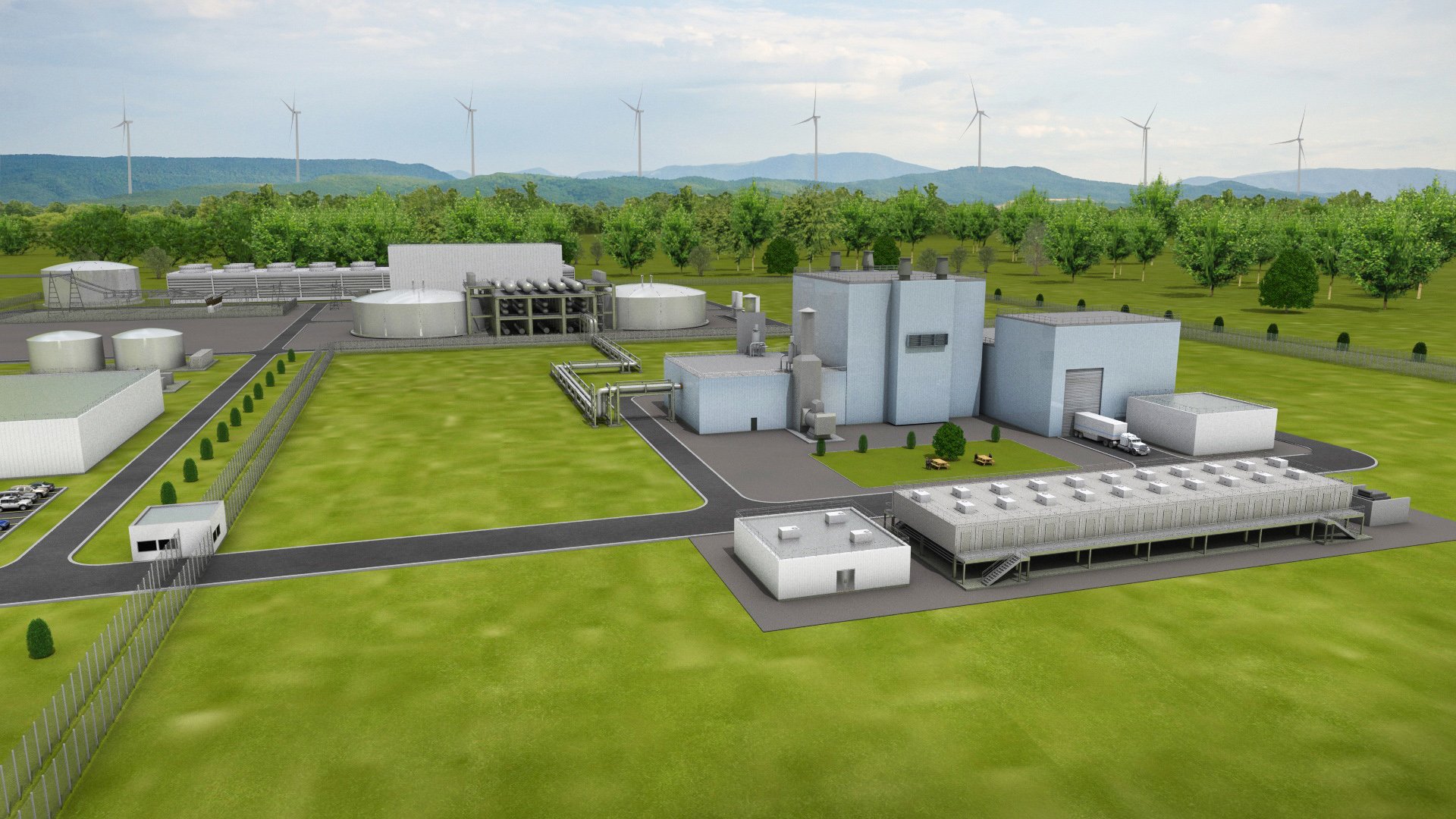The Hunterston B nuclear power station in 2018. (Photo: Thomas Nugent/CC BY-SA 2.0)
Unit B1 at Scotland’s two-unit Hunterston B nuclear power plant was taken off line for good on November 26 after nearly 46 years of operation. A 490-MWe advanced gas-cooled reactor, the unit entered commercial operation in June 1976. Its companion AGR, Unit B2, which entered operation in March 1977, is scheduled for retirement in January.
Artist’s rendering of a BWRX-300 plant. (Photo: GE Hitachi Nuclear Energy)
Ontario Power Generation (OPG) has selected GE Hitachi Nuclear Energy (GEH) as its technology partner for the Darlington nuclear new-build project. The companies will work to deploy GEH’s BWRX-300 small modular reactor at OPG’s Darlington nuclear plant, located in Clarington, Ontario.
The Vogtle-3 turbine building (left) and containment (right) in October. (Photo: Georgia Power)
The Nuclear Regulatory Commission will increase its oversight of Vogtle-3—one of the two Westinghouse AP1000 reactors under construction at the Vogtle nuclear power plant in Waynesboro, Ga.—after finalizing two inspection findings involving the unit’s safety-related electrical cable raceway system. Vogtle’s operator, Southern Nuclear, was informed of the decision in a November 17 letter.
The agency had launched a special inspection at Vogtle-3 in June of this year to determine the cause and extent of construction quality issues in the raceway system, which consists primarily of conduits and cable trays designed to prevent a single event from disabling redundant safety-related equipment.
Diablo Canyon nuclear plant. (Photo: PG&E)
Last April, Entergy had to close its Indian Point nuclear plant. That’s despite the plant’s being recognized as one of the best-run U.S. nuclear plants. That’s also despite its 20-year license extension process having been nearly completed, with full support from the Nuclear Regulatory Commission.
This closure was due in large part to opposition by antinuclear environmental groups. These groups also mobilized existing negative public opinion on nuclear energy to get politicians to oppose the plant’s license extension. Another factor is unfair market conditions. Nuclear energy doesn’t get due government support—unlike solar, wind, and hydro—despite delivering clean, zero-emissions energy.
Statement from American Nuclear Society President Steven Nesbit and Executive Director/CEO Craig Piercy
A whale swims off the coast by Diablo Canyon nuclear power plant. (Image: PG&E)
The American Nuclear Society supports the continued operation of California's Diablo Canyon nuclear power plant. The premature shutdown of Diablo Canyon units 1 and 2, slated respectively in November 2024 and August 2025, will inflict grave harm to California's economy and environment.
Millstone nuclear power plant
The Nuclear Regulatory Commission has granted Dominion Energy’s request for an increase in the generating capacity of Millstone-3. The Richmond, Va.–based utility had applied for the power uprate last November, requesting an increase of approximately 1.6 percent.
NRC staff determined that Dominion could safely increase the reactor’s heat output, primarily through more accurate means of measuring feedwater flow, according to a November 18 press release. The NRC’s safety evaluation focused on several areas, including the nuclear steam supply systems, instrumentation and control systems, electrical systems, accident evaluations, radiological consequences, fire protection, operations and training, testing, and technical specification changes.
Westinghouse president and CEO Patrick Fragman and Energoatom president Petro Kotin sign a contract for the first AP1000 in Ukraine. They are joined by U.S. charge d’affaires to Ukraine Kristina Kvien and Ukraine energy minister Herman Halushchenko. (Photo: Westinghouse)
Westinghouse Electric Company and Energoatom, Ukraine’s state-owned nuclear utility, signed a contract in Kyiv yesterday outlining the details of an agreement to bring the Westinghouse AP1000 reactor to Ukraine’s Khmelnitsky nuclear power plant.
According to a Westinghouse press release, the contract initiates engineering and procurement of long-lead items for the reactor.
Signing the contract were Patrick Fragman, president and chief executive officer of Westinghouse, and Petro Kotin, Energoatom’s acting president. U.S. charge d’affaires to Ukraine, Kristina Kvien, and Ukraine energy minister Herman Halushchenko also attended the event.
A screenshot from NuScale's latest video about three current research facilities. (Image: NuScale)
The Department of Energy is funding an independent review of NuScale Power’s safety analysis report (SAR), to be conducted by Ukraine’s State Scientific and Technical Center for Nuclear and Radiation Safety (SSTC NRS), the Portland, Ore.–based small modular reactor developer announced on November 18.
Artistic rendering of the Hermes low-power demonstration reactor, a scaled-down demo of the KP-FHR. (Image: Kairos Power)
The Nuclear Regulatory Commission recently issued a draft safety evaluation report indicating initial acceptance of Kairos Power’s source term methodology for its fluoride salt–cooled high-temperature reactor (KP-FHR).
The Karachi nuclear plant in southern Pakistan. (Photo: CNNC)
Hot functional testing at Unit 3 of Pakistan’s Karachi nuclear power plant has been completed ahead of schedule, and the reactor has entered the fuel loading stage, China National Nuclear Corporation announced on November 11.





 A
A  and containment (right).jpg)











 In April, President Biden announced a new U.S. climate target: a 50–52 percent reduction in greenhouse gas emissions below 2005 levels by 2030. It’s an ambitious goal, and one that’s right up there with recent climate declarations from Canada, the European Union, and the United Kingdom. It’s also one that, according to
In April, President Biden announced a new U.S. climate target: a 50–52 percent reduction in greenhouse gas emissions below 2005 levels by 2030. It’s an ambitious goal, and one that’s right up there with recent climate declarations from Canada, the European Union, and the United Kingdom. It’s also one that, according to 
